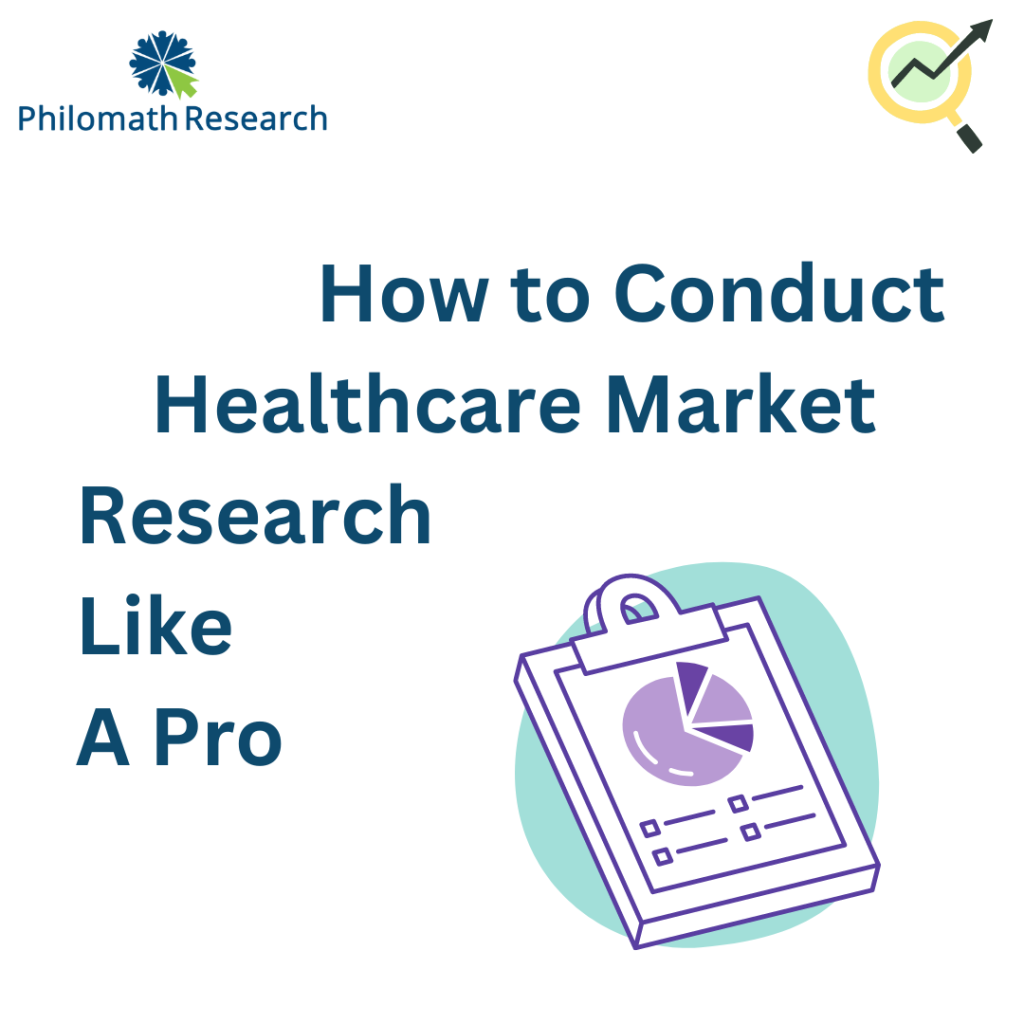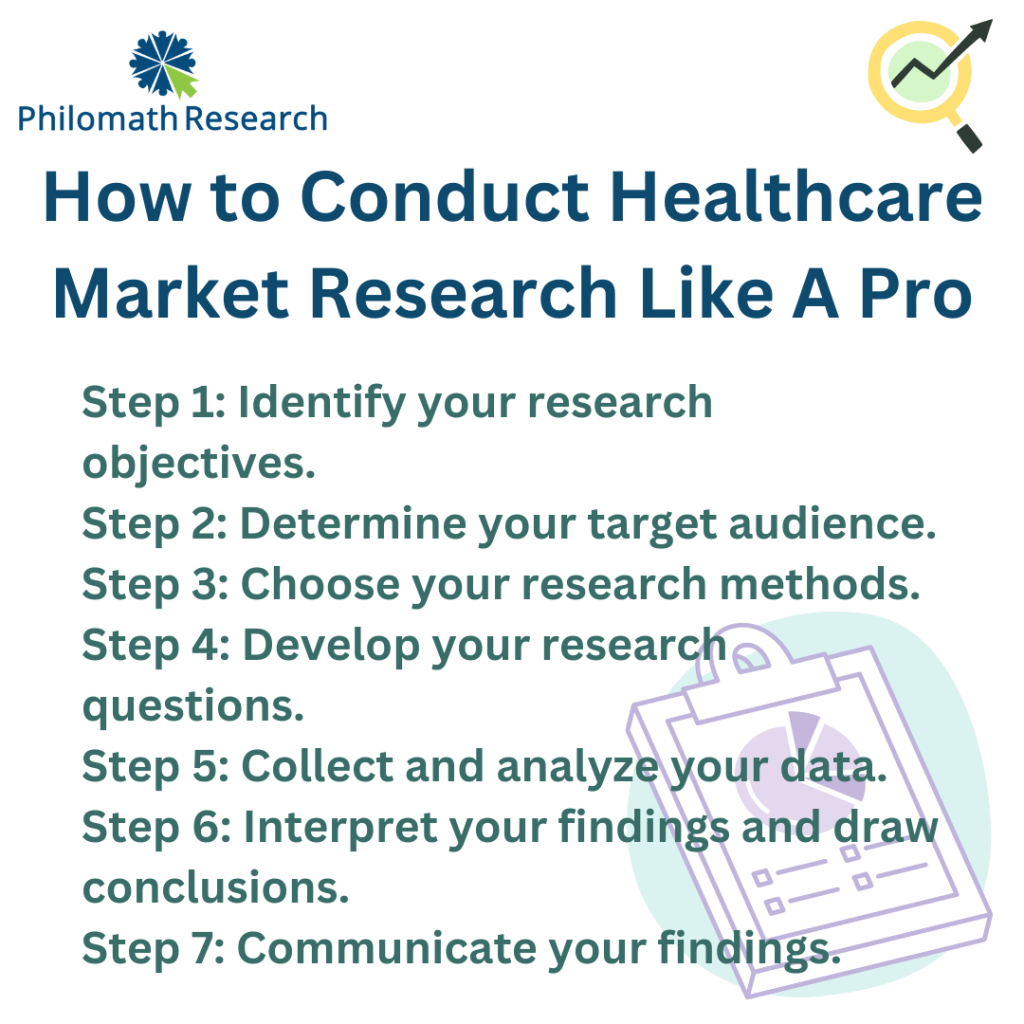
How to Conduct Healthcare Market Research Like A Pro
Market research is a vital tool for businesses in any industry, and healthcare is no exception. Conducting thorough market research can help healthcare organizations understand their customers, competitors, and industry trends, allowing them to make better decisions and improve their overall performance. In this blog, we will discuss how to conduct healthcare market research like a pro.
Step 1: Identify your research objectives.
The first step in any market research project is to define your research objectives. What do you want to achieve through your research? Are you looking to understand customer needs and preferences? Are you interested in exploring new market opportunities? Do you want to assess the effectiveness of your current marketing strategies? Once you have identified your research objectives, you can design a research plan that will help you achieve your goals.
Step 2: Determine your target audience.
Your target audience is the group of people or organizations that you want to study. In healthcare, your target audience may include patients, healthcare providers, insurers, regulators, or other stakeholders. It’s important to define your target audience carefully, as this will impact the research methods you use and the questions you ask.
Step 3: Choose your research methods.
There are many different research methods you can use in healthcare market research, including surveys, focus groups, interviews, and observational studies. Each method has its own strengths and weaknesses, so it’s important to choose the right method for your research objectives and target audience.
Surveys are a popular research method in healthcare market research, as they allow you to collect data from a large number of people quickly and easily. You can administer surveys online, by phone, or in person, depending on your target audience.
Focus groups are another effective research method, as they allow you to gather in-depth insights from a small group of people in a short amount of time. Focus groups are particularly useful for exploring complex topics or sensitive issues.
Interviews are a more personal research method, allowing you to collect detailed information from individual participants. Interviews can be conducted in person or over the phone, depending on the participant’s location and preferences.
Observational studies involve observing and recording behaviors in real-time. This method is particularly useful for studying healthcare providers and their interactions with patients.
Step 4: Develop your research questions.
Once you have chosen your research methods, you need to develop your research questions. Your research questions should be specific, measurable, and relevant to your research objectives. They should also be tailored to your target audience and research methods. For example, if you are conducting a survey, your questions should be brief and easy to understand.
Step 5: Collect and analyse your data.
After you have developed your research questions, you can begin collecting data. This may involve administering surveys, conducting focus groups or interviews, or collecting observational data. Once you have collected your data, you need to analyze it to draw conclusions and insights.
There are many different techniques you can use to analyze your data, including statistical analysis, content analysis, and thematic analysis. The type of analysis you choose will depend on your research questions and the type of data you have collected.
Step 6: Interpret your findings and draw conclusions.
Once you have analyzed your data, you need to interpret your findings and draw conclusions. What do your findings tell you about your target audience, competitors, and industry trends? Are there any opportunities or challenges you need to be aware of? How can you use your findings to improve your business performance?
Step 7: Communicate your findings.
The final step in conducting healthcare market research is to communicate your findings to your stakeholders. This may include presenting your findings in a report or presentation, sharing your insights with your team, or using your findings to inform your marketing and business strategies.

In conclusion, healthcare market research is a vital tool for healthcare organizations looking to understand their customers. The healthcare market research industry is changing all the time. New trends, new challenges and new technology are constantly shaping the way that healthcare organizations approach their customers. If you are interested in learning more about our healthcare market research services, please contact us anytime at www.philomathresearch.com We are always excited to speak with individuals interested in learning more about how we can help your organization!
FAQs
1. What is healthcare market research?
Healthcare market research is the process of gathering and analyzing data about patients, providers, competitors, and the healthcare industry to make informed business decisions. It helps healthcare organizations understand market needs, industry trends, and consumer behavior.
2. Why is market research important in the healthcare industry?
Market research enables healthcare organizations to identify patient needs, improve services, evaluate marketing effectiveness, explore new opportunities, and stay ahead of competitors and regulatory changes.
3. What are the first steps in conducting healthcare market research?
The process begins by identifying clear research objectives—such as understanding customer preferences, assessing marketing strategies, or exploring new markets—and defining a specific target audience.
4. Who can be considered a target audience in healthcare research?
Target audiences may include patients, doctors, nurses, healthcare administrators, insurance providers, government bodies, caregivers, and other healthcare stakeholders.
5. What are the most commonly used research methods in healthcare?
Popular methods include:
- Surveys (online, phone, or face-to-face)
- Focus Groups
- In-depth Interviews
- Observational Studies
Each method has unique benefits depending on the research goals and target audience.
6. How do I choose the right research method for my study?
Your choice should be based on your research goals, the type of information you need, your audience’s availability, and your budget. For example, surveys work well for broad quantitative data, while interviews are better for deep qualitative insights.
7. What makes a good healthcare research question?
Effective questions are specific, relevant, measurable, and easy to understand. They should align closely with your research objectives and chosen methodology.
8. How should I analyze the data collected from my research?
Data analysis methods depend on the type of data collected:
- Quantitative data: Use statistical tools (e.g., SPSS, Excel).
- Qualitative data: Use content or thematic analysis to identify patterns and insights.
9. What should I do after analyzing my data?
Interpret your findings to identify trends, opportunities, and challenges. Use these insights to improve your strategies, products, or services, and share them with relevant stakeholders.
10. How can I communicate my healthcare research findings effectively?
Present your results in a clear and concise format—through reports, presentations, or dashboards. Tailor your communication style depending on the audience, whether it’s internal teams, executives, or external partners.